May 14, 2025 | 09:24 GMT +7
May 14, 2025 | 09:24 GMT +7
Hotline: 0913.378.918
May 14, 2025 | 09:24 GMT +7
Hotline: 0913.378.918
Thanh Ha district, Hai Duong province has transformed its crop structure since 1992, bringing the local lychee area from 1,000 hectares to 3,265 hectares (including early and main season lychee). Among these lychee areas, 500 hectares were recognized as VietGAP-compliant, and 50 hectares were recognized as GlobalGAP-compliant. Thanh Ha district has 45 lychee production areas with 168 production unit codes for the 2023 lychee crop.
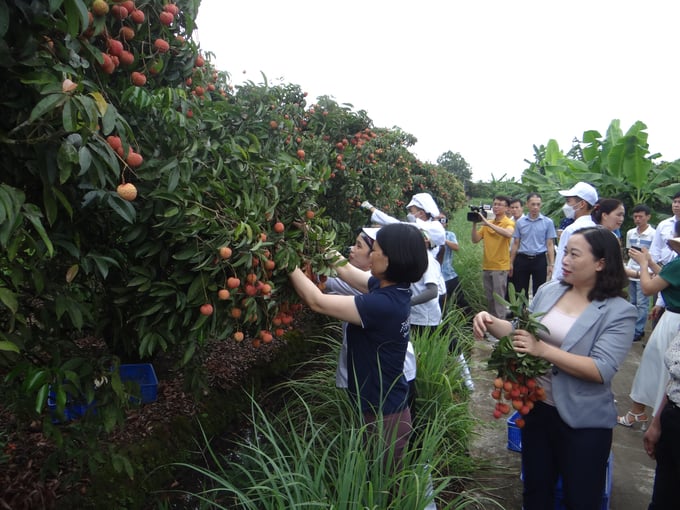
Hai Duong province has implemented various solutions, scientific and technical advancements in terms of lychee varieties and farming processes to improve product quality and design. Photo: Nguyen Thanh.
Thanh Ha lychee features multiple advantages in terms of quality over lychee grown in other localities across Vietnam. Ripened Thanh Ha lychees have thin peels, tough spines, tough silk skin, small seeds, rich and crunchy pulp.
Thanh Ha district has fertile alluvial soil, which is suitable for the cultivation of fruit trees and perennial plants such as lychee, guava, pomelo, etc. The district has established planning for concentrated agricultural production with a focus on scientific research and application to amplify the strengths of each agricultural product. As a result, high quality and unique local lychee products were created.
The National Office of Intellectual Property under Ministry of Science and Technology granted the Certificate of Geographical Indication for Thanh Ha lychee in 2007. This certification laid the foundation for the export of Thanh Ha lychee. In addition, the utilization of new varieties has resulted in higher yields, attractive appearance, scattered harvests, increased value for this lychee.
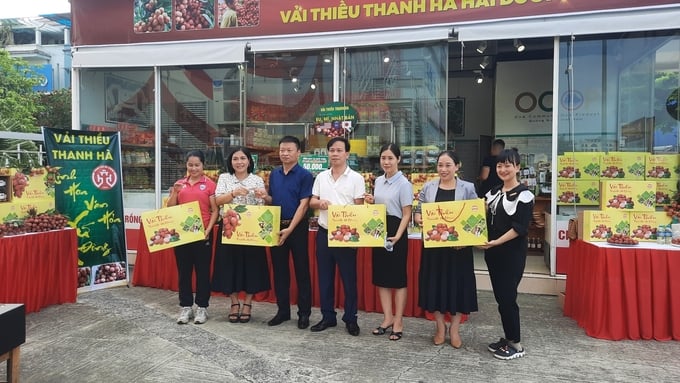
Hai Duong Department of Agriculture and Rural Development bringing Thanh Ha lychee products to Quang Ninh market. Photo: Nguyen Thanh.
In order to contribute to the development of green agriculture, Thanh Ha district has deployed a project titled "Research and build a model of organic Thanh Ha lychee cultivation to increase added value for Hai Duong province's key products”. The project primarily focuses on researching the formula of organic fertilizers and biological products in the prevention of pests and diseases on fruit trees; developing and perfecting the organic lychee cultivation process to replicate in other lychee production areas .
Hai Duong Provincial People's Committee approved the research topic on "Application of technological advancements to conserve and develop the valuable lychee genetic resources in Thanh Son commune". This study has led to a cultivation method that improves the lychee tree's resistance, growth, and development, assisting in the development of ecotourism in Hai Duong province.
Local people have applied scientific and technological advancements to production on a large scale. As a result, productivity and quality of the fruit have improved significantly; the fruit's appeal have been enhanced. On the other hand, the consumption market for lychee has been expanded, and prices have steadily increased. These achievements have raised the income level for Hai Duong farmers as well as improved their quality of life.
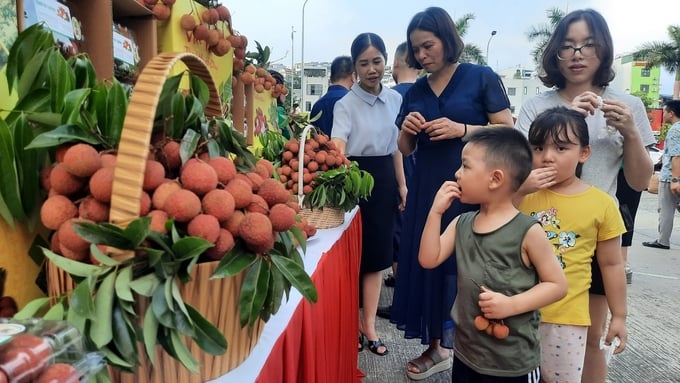
Thanh Ha lychee is popular among consumers in Quang Ninh. Photo: Nguyen Thanh.
Hai Duong province's Department of Agriculture and Rural Development collaborated with Quang Ninh Department of Agriculture and Rural Development to organize an exhibition for Thanh Ha lychee on June 11 in Ha Long City, Quang Ninh province. According to Ms. Thi Kiem, Deputy Director of Hai Duong province's Department of Agriculture and Rural Development , Thanh Ha lychee has established a long-standing image of high quality on the market. Hai Duong and Quang Ninh implemented several connection activities to promote the trade of Thanh Ha lychee.
"With the exhibition for Thanh Ha lychee, we look forward to bringing high-quality Thanh Ha lychee from Hai Duong to the consumers in Quang Ninh's market. The quality of exported and domestically-consumed Thanh Ha lychees are almost identical. The fruit has a sweet and fragrant flavor thanks to a production process that ensure food safety and hygiene", emphasized Ms. Kiem.

Thanh Ha lychees being pacakged for export. Photo: Nguyen Thanh.
According to Mr. Nguyen Van Duc, Deputy Director of Quang Ninh province's Department of Agriculture and Rural Development, Quang Ninh routinely imports large amounts of agricultural products from neighboring provinces and cities, including Hai Duong province, due to its limited local production and high consumption.
Local governments will encourage activities that introduce and bring high quality agricultural products from Hai Duong to Quang Ninh. Both provinces will prioritize connecting 200 Hai Duong's OCOP agricultural products.
The yield of Thanh Ha lychee is estimated to reach 60,000 tons by the end of 2023. So far, farmers have harvested over 40,000 tons of this lychee. Over 50% of Thanh Ha's lychee is currently exported to foreign countries, including fastidious markets such as the Europe, the US, and Japan. Most notably, Thanh Ha was served as airline food for the first time in 2023. This is an important event in promoting and introducing Thanh Ha lychee to both domestic and international customers.
Translated by Nguyen Hai Long

(VAN) U.S. tariffs are not only a 'shock', but also an opportunity for Vietnamese businesses to renew their mindset toward comprehensive development.

(VAN) As Bac Giang lychee enters the harvest season, Minister Do Duc Duy expects that the fruit will contribute greatly to agricultural exports due to standardized production and deep processing.

(VAN) Consumers have shown a preference for free-range eggs, but those farming systems are more vulnerable to biosecurity risks like bird flu.
/2025/05/09/5701-1-184335_301.jpg)
(VAN) Vietnam’s eel exports nearly doubled thanks to a mud-free farming model, opening up new prospects while still facing numerous barriers related to international standards.

(VAN) Minister Do Duc Duy warned that if production is not professionalized and supply chains are not transparent, the U.S. market could become a growth bottleneck.
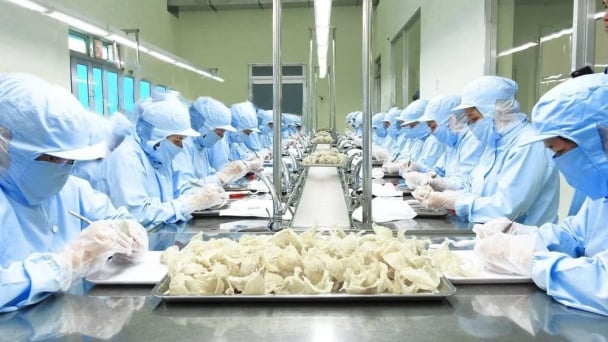
(VAN) Delegating surveillance responsibilities to local authorities is a cost-saving and efficiency-boosting measure that removes a key bottleneck for enterprises, according to Director General Duong Tat Thang.
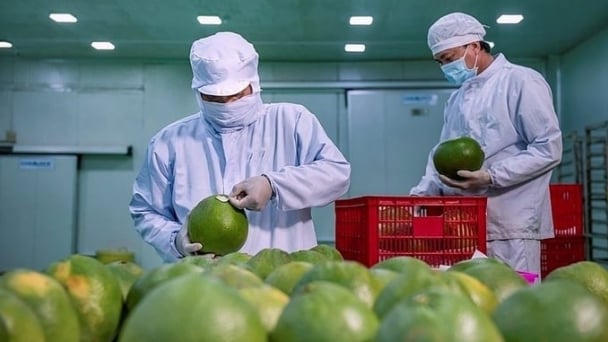
(VAN) Australia's final report on biosecurity has just been released, contributing to expanding the market for Vietnam's fruit with an output of nearly 1 million tons.